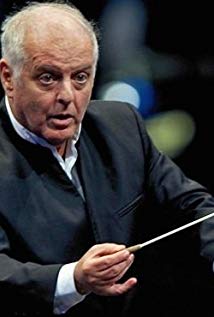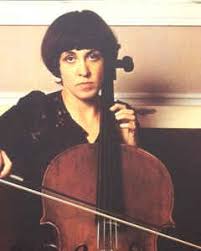This Week in Classical Music: November 11, 2019.The interpreters. Even though Alexander Borodin, Aaron Coplandand Paul Hindemith were born this week, we’ll dedicate this entry not to composers but to musicians who interpret their music.And this week was rich in this respect: several talented pianists, conductors, and string players have their birthdays or anniversaries this week.Daniel Barenboim who was born on November 15th of 1942 in Buenos Aires, Argentina, spans two categories, that of a pianist and a conductor.Barenboim started out as a piano wunderkind: the conductor Wilhelm Furtwängler and the pianist Edwin Fischer both hailed him as “phenomenon.”The Barenboim family moved from Argentina to Israel when Daniel was 10.He studied with Nadia Boulanger in Rome, played at the Mozarteum in Salzburg, met Zubin Mehta, Pinchas Zukerman, Itzhak Perlman and in 1967, in London, the young cellist Jacqueline Du Pré, whom he married later that year. The friendship between these five outstanding musicians was remarkable; they played together often – some of the best violin recordings were made by Perlman and Zukerman playing with Barenboim; there is even a recording of the five of them playing Schubert’s "Trout" Quintet.From the 1960s to 2000s Barenboim had one of the most successful piano careers, but he was also interested in conducting, which he studied with Igor Markevich from the age of 12.He debuted as a conductor in 1966; in 1977 he conducted the opera (Don Giovanni) for the first time and since then has performed in all major opera houses, including Baireuth, Paris, London, New York and Milan’s La Scala, where he was the music director.From 1989 to 2006 he was also the music director of the Chicago Symphony, succeeding Sir Georg Sotli.Since 1992 Berenboim has been the music director of the Berlin State Opera and its resident orchestra, the Staatskapelle Berlin, of which he was made Conductor for Life.Barenboim is one of the most frequently recorded musicians of our time.
Another wonderful musician is alive and well – the cellist Natalia Gutman. Her career was not as illustrious as Barenboim’s, but not for lack of musicianship or skill: cellists are rarely glorified the way pianists and conductors are.In one aspect, though, they are alike: Barenboim formed a close circle of musical friends, and so did Gutman, with none other than Sviatoslav Richter and the violinist Oleg Kagan.This close relationship was rather unusual, as Richter was much older and much more famous than either Gutman and or Kagan.Like Barenboim, Gutman made music with her friends: three of them recorded trios by Schumann, Franck, Debussy, Ravel and Tchaikovsky.Gutman and Richter recorded cello sonatas by Frédéric Chopin, Camille Saint-Saëns, Prokofiev, Britten and more.And, like Barenboim, who married Jacqueline Du Pré, Gutmann eventually married Oleg Kagan.Natasha Gutman was born one day earlier than Barenboim, on November 14th of 1942 in Kazan, Russia. At the Moscow Conservatory she studied with the famous cellist and teacher Galina Kozolupova; later she took classes with Mstislav Rostropovich.As a student Gutman successfully participated in several international competitions, after which her international career took off.She played and recorded with major orchestras and conductors and participated in the Salzburg, Lucerne and other festivals.Together with Claudio Abbado she organized the “Berlin Encounters” festival and later, after the death of her husband Oleg Kagan, a festival in Kreuth, Bavaria, dedicated to his memory. Gutman inspired many noted composers: Alfred Schnittke, Edison Denisov and Sofia Gubaidulina wrote cello compositions for her. These days Gutman teaches at the Moscow Conservatory and musical school in Fiesole, Italy.Here’s Gutman and Richter playing Prokofiev’s Cello Sonata op. 119 in a live recording from 1992.
Barenboim, Gutman 2019
This Week in Classical Music: November 11, 2019. The interpreters. Even though Alexander Borodin, Aaron Coplandand Paul Hindemith were born this week, we’ll dedicate this entry not to composers but to musicians who interpret their music. And this week was rich in this respect: several talented pianists, conductors, and string players have their birthdays or anniversaries this week. Daniel Barenboim who was born on November 15th of 1942 in Buenos Aires, Argentina, spans two categories, that of a pianist and a conductor. Barenboim started out as a piano wunderkind: the conductor Wilhelm Furtwängler and the pianist Edwin Fischer both hailed him as “phenomenon.” The Barenboim family moved from Argentina to Israel when Daniel was 10. He studied with Nadia Boulanger in Rome, played at the Mozarteum in Salzburg, met Zubin Mehta, Pinchas Zukerman, Itzhak Perlman and in 1967, in London, the young cellist Jacqueline Du Pré, whom he married later that year. The friendship between these five outstanding musicians was remarkable; they played together often – some of the best violin recordings were made by Perlman and Zukerman playing with Barenboim; there is even a recording of the five of them playing Schubert’s "Trout" Quintet. From the 1960s to 2000s Barenboim had one of the most successful piano careers, but he was also interested in conducting, which he studied with Igor Markevich from the age of 12. He debuted as a conductor in 1966; in 1977 he conducted the opera (Don Giovanni) for the first time and since then has performed in all major opera houses, including Baireuth, Paris, London, New York and Milan’s La Scala, where he was the music director. From 1989 to 2006 he was also the music director of the Chicago Symphony, succeeding Sir Georg Sotli. Since 1992 Berenboim has been the music director of the Berlin State Opera and its resident orchestra, the Staatskapelle Berlin, of which he was made Conductor for Life. Barenboim is one of the most frequently recorded musicians of our time.
composers but to musicians who interpret their music. And this week was rich in this respect: several talented pianists, conductors, and string players have their birthdays or anniversaries this week. Daniel Barenboim who was born on November 15th of 1942 in Buenos Aires, Argentina, spans two categories, that of a pianist and a conductor. Barenboim started out as a piano wunderkind: the conductor Wilhelm Furtwängler and the pianist Edwin Fischer both hailed him as “phenomenon.” The Barenboim family moved from Argentina to Israel when Daniel was 10. He studied with Nadia Boulanger in Rome, played at the Mozarteum in Salzburg, met Zubin Mehta, Pinchas Zukerman, Itzhak Perlman and in 1967, in London, the young cellist Jacqueline Du Pré, whom he married later that year. The friendship between these five outstanding musicians was remarkable; they played together often – some of the best violin recordings were made by Perlman and Zukerman playing with Barenboim; there is even a recording of the five of them playing Schubert’s "Trout" Quintet. From the 1960s to 2000s Barenboim had one of the most successful piano careers, but he was also interested in conducting, which he studied with Igor Markevich from the age of 12. He debuted as a conductor in 1966; in 1977 he conducted the opera (Don Giovanni) for the first time and since then has performed in all major opera houses, including Baireuth, Paris, London, New York and Milan’s La Scala, where he was the music director. From 1989 to 2006 he was also the music director of the Chicago Symphony, succeeding Sir Georg Sotli. Since 1992 Berenboim has been the music director of the Berlin State Opera and its resident orchestra, the Staatskapelle Berlin, of which he was made Conductor for Life. Barenboim is one of the most frequently recorded musicians of our time.
Another wonderful musician is alive and well – the cellist Natalia Gutman. Her career was not as illustrious as Barenboim’s, but not for lack of musicianship or skill: cellists are rarely glorified the way pianists and conductors are. In one aspect, though, they are alike: Barenboim formed a close circle of musical friends, and so did Gutman, with none other than Sviatoslav Richter and the violinist Oleg Kagan. This close relationship was rather unusual, as Richter was much older and much more famous than either Gutman and or Kagan. Like Barenboim, Gutman made music with her friends: three of them recorded trios by Schumann, Franck, Debussy, Ravel and Tchaikovsky. Gutman and Richter recorded cello sonatas by Frédéric Chopin, Camille Saint-Saëns, Prokofiev, Britten and more. And, like Barenboim, who married Jacqueline Du Pré, Gutmann eventually married Oleg Kagan. Natasha Gutman was born one day earlier than Barenboim, on November 14th of 1942 in Kazan, Russia. At the Moscow Conservatory she studied with the famous cellist and teacher Galina Kozolupova; later she took classes with Mstislav Rostropovich. As a student Gutman successfully participated in several international competitions, after which her international career took off. She played and recorded with major orchestras and conductors and participated in the Salzburg, Lucerne and other festivals. Together with Claudio Abbado she organized the “Berlin Encounters” festival and later, after the death of her husband Oleg Kagan, a festival in Kreuth, Bavaria, dedicated to his memory. Gutman inspired many noted composers: Alfred Schnittke, Edison Denisov and Sofia Gubaidulina wrote cello compositions for her. These days Gutman teaches at the Moscow Conservatory and musical school in Fiesole, Italy. Here’s Gutman and Richter playing Prokofiev’s Cello Sonata op. 119 in a live recording from 1992.
as illustrious as Barenboim’s, but not for lack of musicianship or skill: cellists are rarely glorified the way pianists and conductors are. In one aspect, though, they are alike: Barenboim formed a close circle of musical friends, and so did Gutman, with none other than Sviatoslav Richter and the violinist Oleg Kagan. This close relationship was rather unusual, as Richter was much older and much more famous than either Gutman and or Kagan. Like Barenboim, Gutman made music with her friends: three of them recorded trios by Schumann, Franck, Debussy, Ravel and Tchaikovsky. Gutman and Richter recorded cello sonatas by Frédéric Chopin, Camille Saint-Saëns, Prokofiev, Britten and more. And, like Barenboim, who married Jacqueline Du Pré, Gutmann eventually married Oleg Kagan. Natasha Gutman was born one day earlier than Barenboim, on November 14th of 1942 in Kazan, Russia. At the Moscow Conservatory she studied with the famous cellist and teacher Galina Kozolupova; later she took classes with Mstislav Rostropovich. As a student Gutman successfully participated in several international competitions, after which her international career took off. She played and recorded with major orchestras and conductors and participated in the Salzburg, Lucerne and other festivals. Together with Claudio Abbado she organized the “Berlin Encounters” festival and later, after the death of her husband Oleg Kagan, a festival in Kreuth, Bavaria, dedicated to his memory. Gutman inspired many noted composers: Alfred Schnittke, Edison Denisov and Sofia Gubaidulina wrote cello compositions for her. These days Gutman teaches at the Moscow Conservatory and musical school in Fiesole, Italy. Here’s Gutman and Richter playing Prokofiev’s Cello Sonata op. 119 in a live recording from 1992.